Ramón Estévez regrets his name change to Martin Sheen
The son of a Spanish immigrant, he starred in ‘Apocalypse Now,’ ‘The Departed’ and ‘The West Wing.’ Now 81, the actor regrets not keeping his real name during his artistic career
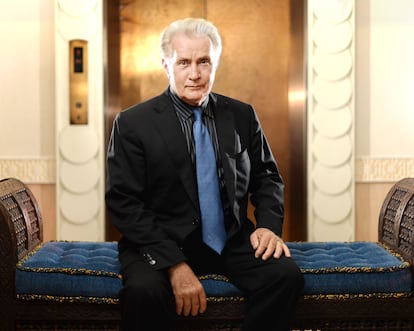

At the beginning of the 1960s, Ramón Estévez was desperate. His first steps as a television actor had gone well, but he felt stuck in that medium and wanted to get into theater and film. However, at the time, his name held him back: there were few successful Latinos in the United States. “Whenever I called for a position, whether for work or for an apartment, they answered me hesitantly when I gave my name, and when I arrived, I found the position already filled.” He said in 2003. And so, Ramón decided to create an artistic name by merging the name of Robert Dale Martin, the CBS network’s casting director who had helped him in those essential roles on the small screen, with that of Bishop Fulton J. Sheen, who, as Estévez’s little sister Carmen recalls, “regularly appeared on TV.”
This is how Martin Sheen came about, and owing to his great talent, he triumphed first in theater and later as an actor in the movies, notably: Badlands, Apocalypse Now, The Departed, and Wall Street. However, the identity of Ramón Antonio Gerardo Estévez did not disappear: this name remains in all of Sheen’s official documents (passport, driver’s license and marriage license)... and in the actor’s soul.
Last week, in an interview with Closer magazine, he confessed that one of the great regrets of his life was his change of name. He speaks with pride of the obstinacy of his son Emilio, who kept it despite “his agent’s advice to change it.” Regarding his own decision, he reflects: “Sometimes they convince you, when you don’t have enough insight or even enough courage to stand up for what you believe in, and you pay for it later.”
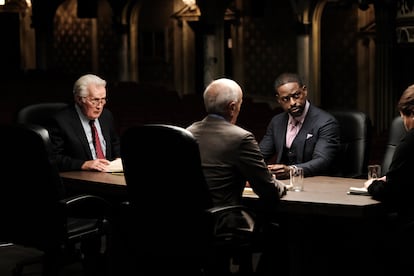
Over time, Sheen recovered his Galician roots, the region in northwestern Spain where his father, Francisco Estévez Martínez, was born. Francisco was an immigrant who left the town of Parderrubias for Cuba at the age of 18 in 1916. In the early 1930s he emigrated to the United States to a modest Irish neighborhood in Dayton (Ohio), where he married another immigrant, Mary-Ann Phelan.
Martin Sheen’s life has been profoundly marked by his childhood. His father worked at NCR Corporation, an industrial conglomerate that began manufacturing cash registers. Shortly after his marriage, the company sent him to the Bermuda Islands where his first children were born. Sheen was the seventh of 10 children (nine boys and one girl), and the first to be born in Dayton, in 1940, after the family moved back to the US. His left arm was clasped by forceps during birth, leaving it three inches shorter than his right arm. As a result of this, the character that Sheen plays in the series The West Wing, President Josiah Bartlet, puts on his jacket with a strange twist of the body. As a child, he suffered from polio which kept him bedridden for a year, and at the age of 11 his mother died. Thanks to the support of a Catholic charity and his own father’s efforts, the family remained united against the distribution of the children to orphanages or foster homes, a common practice at the time.
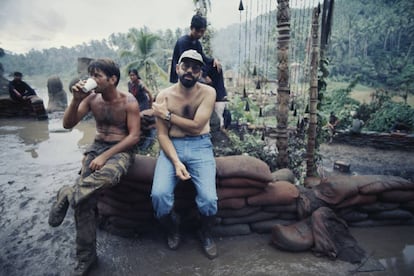
He was the eccentric member of the family: he decided to go into acting against his father’s wishes. “You don’t know how to sing or dance!”, his father told him, to which his son replied: “You love Westerns and nobody sings or dances in those.” “But you can’t ride a horse either!” was his father’s comeback. Despite this discouragement, he moved to New York, following in the footsteps of his idol, James Dean.
In Two Cathedrals, the much-talked about episode and second season finale of The West Wing, the character President Bartlet reflects the experiences of his own childhood and adolescence. Estévez/Sheen: a practicing Catholic and relentless campaigner against global warming, a man in favor of civil and immigrant rights, he was arrested several times during demonstrations outside the White House. His activism began when he was just 14 years old in a golf club where he worked. He led a strike of caddies, protesting against the club members’ use of bad language in front of children.
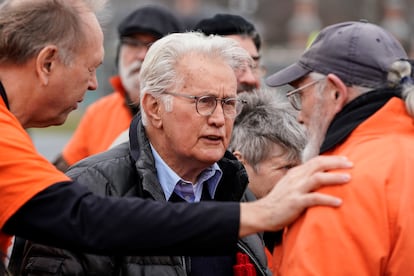
And then there’s the Spanish context. Francisco Estévez did not teach his children Spanish, but the Estévez family went back to their roots. Francisco was able to return to his hometown in Galicia in 1967 (just as Sheen landed his first big role in In the Custody of Strangers), where he began building a house, while making regular trips back to Dayton. He would never see this house finished. He died in Dayton in 1974, and was buried with his wife and son Manuel, who had died in 1968. His only daughter, Carmen, ended up working as an English teacher at a school in Madrid, where she married. For years people in Madrid have bumped into Sheen during his visits to his sister. Carmen finished building her father’s house and inaugurated a river promenade dedicated to his memory. Indeed, she has kept the memory of the Estévez family alive in the area.
The Camino de Santiago, a dream come true
In the early 2000s, Sheen, his son Emilio Estévez and his grandson Taylor walked the Camino de Santiago, the famous medieval pilgrimage route also known as the Way of Saint James. In Burgos, the grandson met a girl, and at the end of the walk he decided not to return to Los Angeles, but to remain in the Spanish city, where he got married. Influenced by that experience, Sheen and Estévez made the film El camino (2010), in which both co-starred and which the latter directed. A few months ago, Sheen spoke proudly of El camino, a great success and a faithful portrayal of his spirituality. During filming, at a lunch under huge pergolas at the back of Burgos cathedral, Sheen explained: “I am a Catholic, and a lot of that spirituality is in this movie. I have had an extremely happy life, with the normal highs and lows of a career. I have survived disease and my family is wonderful [his four children, including Charlie Sheen, are actors]... I believe in a church that does incredible work in the Third World. Other things, like some of the pronouncements from the Pope [at that time, Benedict XVI], are more difficult for me. I live my faith, and it is between God and I.” A few meters from Sheen and the journalist, at the long tables, was a group that didn’t look like actors: “That’s my wife, that’s my sister and her husband, that my best childhood friend... I’ve invited them to come and have a good time with Emilio, Taylor [who worked as an assistant] and me”. Taylor Estévez currently works as a stunt coordinator in California.
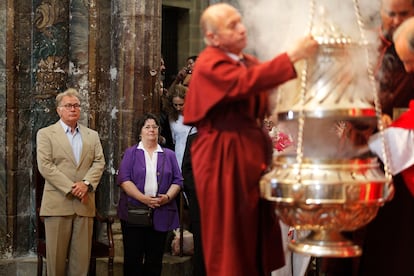
Carmen Estévez says that for decades the family did not understand their father’s deeply Galician sense of humor, until they realized that for much of the time he was not being serious. This sarcasm was inherited by his son Ramón/Martin, and he made a display of this in Burgos. In response to a question about his career, he said: “With my resume full of bad movie titles, what can I say. I’m an actor and that’s how I’ve supported my family. But I’ve been in about 10 films that I can be proud of...” at which point he dropped his cup of coffee and blurted out: “See? For gloating over my career. Divine punishment.”
Tu suscripción se está usando en otro dispositivo
¿Quieres añadir otro usuario a tu suscripción?
Si continúas leyendo en este dispositivo, no se podrá leer en el otro.
FlechaTu suscripción se está usando en otro dispositivo y solo puedes acceder a EL PAÍS desde un dispositivo a la vez.
Si quieres compartir tu cuenta, cambia tu suscripción a la modalidad Premium, así podrás añadir otro usuario. Cada uno accederá con su propia cuenta de email, lo que os permitirá personalizar vuestra experiencia en EL PAÍS.
¿Tienes una suscripción de empresa? Accede aquí para contratar más cuentas.
En el caso de no saber quién está usando tu cuenta, te recomendamos cambiar tu contraseña aquí.
Si decides continuar compartiendo tu cuenta, este mensaje se mostrará en tu dispositivo y en el de la otra persona que está usando tu cuenta de forma indefinida, afectando a tu experiencia de lectura. Puedes consultar aquí los términos y condiciones de la suscripción digital.








































